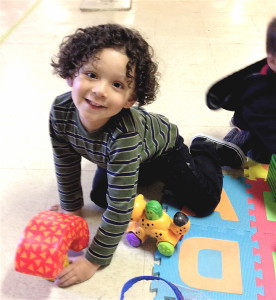A tour of the Kith and Kin Project in Flagstaff
By Cynthia Pardo / First Things First
“Hay muchas cosas que devemos a aprender, como, escuchar a nuestros hijos, involucrarlos en todo para que aprendan a desenvolverse major,” said Ms. Lopez about how much she has learned about ways to support the growth and learning of the kids that she cares for in her home.
There are many like Lopez who take care of the nieces and nephews, grandchildren and maybe other kids from the neighborhood. They tend to be known as babysitters, but after taking part in the Arizona Kith and Kin Project, they go home seeing themselves as educators.
“When we go up to the grandma and ask them, ‘Are you providing child care?’ often times they say no, because this is family and this is what we do,” Claudia Ortiz, assistant program coordinator with the Arizona Kith and Kin Project, described how it is reaching an often underserved, or hidden, population of people who care for children in their own home.
“So we want to target this population and bring them the training and knowledge and support that they need in order to be able to help these children become successful, be ready to enter school and be prepared for kindergarten.”
Through funding from First Things First, the Arizona Kith and Kin Project of the Association for Supportive Child Care, is working with local communities to improve the quality of care provided by “kith and kin,” or “family, friend and neighbor” childcare providers who are often unregulated and untrained. Through a 14-week series of classes, the program provides training and skill-building focused on increasing the caregiver’s knowledge and understanding of early childhood development, health and nutrition, safety and injury prevention, language and literacy, first aid and CPR certification, crib safety and resources such as cribs, car seats and play-based activities for their home. Research shows that more than 50 percent of children in working families are cared for by family, friends and neighbors. And often these providers are unregulated and untrained.
“Our goal is to level the playing field,” said Francince Loper, instructor with the Arizona Kith and Kin Project. “We all know that well-trained teachers and instructors make a difference in a child’s life. But we also know that the love they get from that steady relative or family, friend or neighbor — that person that they develop a bond with — is extremely important in a child’s life. So these people need our help, so that they learn the techniques to deliver the essentials that kids need so when they start kindergarten they are prepared and they are not falling behind. They are ready to go and they are taking off, strongly and swiftly. And that’s what we need and try to do. We try to fill that void that is out there. ”
“As a teacher at the community college I have seen motivated and unmotivated students … And I truly believe that if you haven’t started a child with loving books, loving music and loving learning, by the time they are a certain age, by 5, then it’s going to be harder for them … And that goes all the way up into college,” said Star Hunter, a former instructor at Coconino Community College, during the tour of the Flagstaff class with members from the Coconino Hispanic Advisory Council.In collaboration with Our Lady of Guadalupe Church, the Kith and Kin Project was able to offer a comfortable and accessible location in Flagstaff, where the providers could bring the children to be cared for by Kith and Kin staff in the newly renovated chapel basement.
Since 2012, the First Things First Coconino Regional Partnership Council has funded the strategy of family, friend and neighbor care through the Arizona Kith and Kin Project in different communities across the region, in Flagstaff, Fredonia, Hopi Tribal area, Kaibab Band of Paiute Indian tribal area and Page. On average the program serves about 15 providers per class and typically offers the series two times in each community to reach these often hard-to-reach populations.

